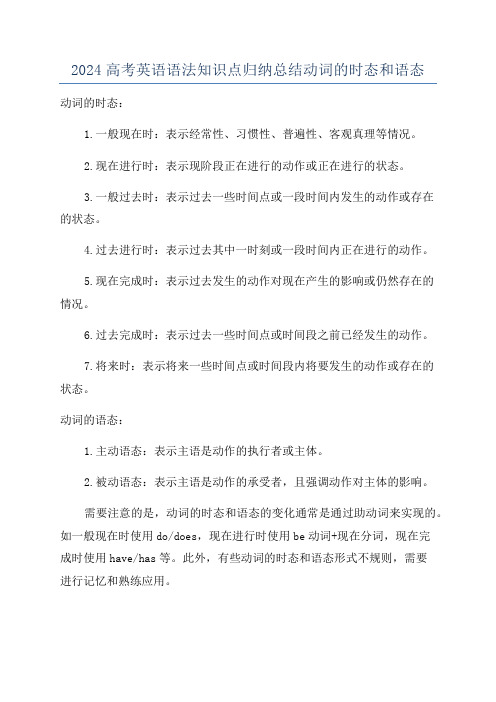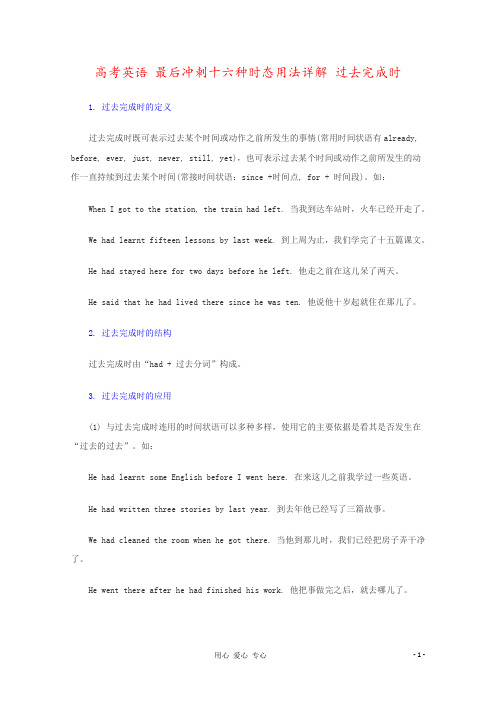高考英语总复习(专题攻略)之时态语态 过去完成时
- 格式:doc
- 大小:109.01 KB
- 文档页数:3

高考英语时态详解一、现在一般时1.表示普遍的事实或真理名言The sun rises in the east and sets in the west.太阳东升西落。
Time flies.时光飞逝。
Failure is the mother of success.失败是成功之母。
2.表示经常性的重复活动,包括动作和状态(常态)I often get up at 6 o’clock in the morning.我经常早晨六点起床。
I am an English teacher.我是一名英语老师。
二、现在进行时1.表示现在正在做的动作He is playing the piano now.他现在在弹钢琴。
2.表示即将发生的动作(come, go, arrive, leave, start, begin, return, die, take...) They are coming to dinner.他们要来吃晚餐。
I am leaving.我要走了。
3.表示现阶段正在进行的动作或者发生的事We are learning English this summer holiday.我这个暑假在学英语。
三、现在完成时表示到目前为止已经完成的动作,如果是延续性动词,表示持续到现在的动作或者状态I have received your letter.我已经收到了你的信。
He has been here for 10 years.他在这住了十年了。
四、现在完成进行时表示一直持续到现在,且可能继续持续下去I have been learning English in school for 7 years.我在学校学英语7年了。
It has been raining for 2 hours.雨下了两个小时了。
五、过去一般时过去的动作,习惯,事实I began to learn English five years ago.我五年前开始学英语。


2024高考英语语法知识点归纳总结动词的时态和语态
动词的时态:
1.一般现在时:表示经常性、习惯性、普遍性、客观真理等情况。
2.现在进行时:表示现阶段正在进行的动作或正在进行的状态。
3.一般过去时:表示过去一些时间点或一段时间内发生的动作或存在
的状态。
4.过去进行时:表示过去其中一时刻或一段时间内正在进行的动作。
5.现在完成时:表示过去发生的动作对现在产生的影响或仍然存在的
情况。
6.过去完成时:表示过去一些时间点或时间段之前已经发生的动作。
7.将来时:表示将来一些时间点或时间段内将要发生的动作或存在的
状态。
动词的语态:
1.主动语态:表示主语是动作的执行者或主体。
2.被动语态:表示主语是动作的承受者,且强调动作对主体的影响。
需要注意的是,动词的时态和语态的变化通常是通过助动词来实现的。
如一般现在时使用do/does,现在进行时使用be动词+现在分词,现在完
成时使用have/has等。
此外,有些动词的时态和语态形式不规则,需要
进行记忆和熟练应用。

高考时态知识点总结时态是英语语法中非常重要的一个概念,掌握好时态的使用可以使我们的表达更加准确、清晰。
在高考中,时态知识点的考查频率也相当高。
下面是对高考常考的时态知识点进行总结,希望能对广大考生有所帮助。
一、一般现在时(Simple Present Tense)一般现在时用于表示习惯性的动作、客观事实、真理以及现在的状态等。
常见的句子结构有:1. 主语+谓语动词:I play basketball.2. 主语+be(am/is/are)+表语:They are students.3. 主语+助动词do/does+动词原形:She doesn't like coffee.二、一般过去时(Simple Past Tense)一般过去时用于表示发生在过去某个时间的动作或状态。
常见的句子结构有:1. 主语+谓语动词:She danced at the party last night.2. 主语+助动词did+动词原形:I didn't see him yesterday.三、一般将来时(Simple Future Tense)一般将来时用于表示将来某个时间将要发生的动作或者一般的计划、安排。
常见的句子结构有:1. 主语+will+动词原形:He will go to Beijing tomorrow.2. 主语+be going to+动词原形:We are going to visit our grandparents next week.四、现在进行时(Present Continuous Tense)现在进行时用于表示现阶段正在进行的动作。
常见的句子结构有:1. 主语+be(am/is/are)+动词-ing形式:They are playing tennis now.2. 主语+be(am/is/are)+not+动词-ing形式:She is not watching TV at the moment.五、过去进行时(Past Continuous Tense)过去进行时用于表示过去某个时间正在进行的动作。

高考英语最后冲刺十六种时态用法详解过去完成时1. 过去完成时的定义过去完成时既可表示过去某个时间或动作之前所发生的事情(常用时间状语有already, before, ever, just, never, still, yet),也可表示过去某个时间或动作之前所发生的动作一直持续到过去某个时间(常接时间状语:since +时间点, for + 时间段)。
如:When I got to the station, the train had left. 当我到达车站时,火车已经开走了。
We had learnt fifteen lessons by last week. 到上周为止,我们学完了十五篇课文。
He had stayed here for two days before he left. 他走之前在这儿呆了两天。
He said that he had lived there since he was ten. 他说他十岁起就住在那儿了。
2. 过去完成时的结构过去完成时由“had + 过去分词”构成。
3. 过去完成时的应用(1) 与过去完成时连用的时间状语可以多种多样,使用它的主要依据是看其是否发生在“过去的过去”。
如:He had learnt some English before I went here. 在来这儿之前我学过一些英语。
He had written three stories by last year. 到去年他已经写了三篇故事。
We had cleaned the room when he got there. 当他到那儿时,我们已经把房子弄干净了。
He went there after he had finished his work. 他把事做完之后,就去哪儿了。
注意:当主句跟由before, after, as soon as所引导的时间从句的动作连接很紧密时,从句也可用一般过去时。

高考英语时态语态知识点一、时态知识点1. 一般现在时一般现在时表示经常性或习惯性的动作、状态或客观真理等。
例句:Water boils at 100 degrees Celsius.2. 一般过去时一般过去时表示过去某个时间发生的动作或存在的状态。
例句:She lived in London for five years.3. 一般将来时一般将来时表示将来某个时间即将发生的动作或存在的状态。
例句:I will finish my homework tomorrow.4. 现在进行时现在进行时表示现在正在进行的动作。
例句:They are watching a movie right now.5. 过去进行时过去进行时表示过去某个时间正在进行的动作。
例句:She was studying when I called her.6. 将来进行时将来进行时表示将来某个时间正在进行的动作。
例句:This time next week, we will be traveling in Japan.7. 现在完成时现在完成时表示过去某个时间发生的动作对现在造成的影响或结果。
例句:I have finished my homework.8. 过去完成时过去完成时表示过去某个时间或动作之前已经发生的动作或存在的状态。
例句:She had already left when I arrived.9. 将来完成时将来完成时表示将来某个时间之前已经完成的动作或存在的状态。
例句:By this time tomorrow, I will have finished my report.二、语态知识点1. 主动语态主动语态表示主语是动作的执行者。
例句:She wrote a letter.2. 被动语态被动语态表示主语是动作的承受者,强调动作对主语的影响。
例句:The letter was written by her.3. 进行时的被动语态进行时的被动语态表示主语正在被动地进行某个动作。
课后作业一、真题演练:单句语法1. When I die, I ____________(give) everything to you.2. That was definitely not an attractive idea, so I politely declined her invitation, .____________(close) m y book and walked away.3. His fear of failure __________(keep) him from classroom games that other students played with joyousabandon.4. _______________(speak) out your inner feeling won’t make you feel ashamed, on the contrary,5. _____________(complete) the project as planned, we’ll have to work two more hours a day.6.It was raining lightly when I___61___ (arrive) in Yangshuo just before dawn.7. This cycle 48 (go) day after day:The walls warm up during the day and cool off during the night and are thus always a timely offset(抵消) for the outside temperatures.8. In 1969,the pollution was terrible along the Cuyahoga River near Cleveland,Ohio.It 61 (be) unimaginable that it could ever be cleaned up.9. Be patient!Tai Chi 66 (call) “shadow boxing” in English.It asks you to act like water:10.Unless some extra money (find),the theatre will close11.When a new day breaks,the walls have given up their heat and are now cold enough 46 (cool) the house during the hot day;at the same time,they warm up again for the night.12. In addition to their simple beauty,what makes the adobe dwellings admirable is their ability to “air condition” a house wi thout 44 (use) electric equipment.13. The adobe dwellings(土坯房) 41 (build) by the Pueblo Indians of the American Southwest are admired by even the most modern of architects and engineers.二、单选题1. When I was young, I ________ with my grandma in the countryside, which is unforgettable.A. livedB. have livedC. was livedD. had lived2. –Excuse me, is the book Gone with the Wind by Margaret Mitchell available now?-Sorry, but it _________ so well that we don’t have any in store.A. sellsB. is soldC. has soldD. has been sold3. The tourism of Linyi _________ rapid growth over the last decade. Now it’s the second most visited city in Shandong Province.A. sawB. had seenC. is seeingD. has seen4. Great changes _____place in my hometown during the past three decades.A. tookB. have takenC. were takenD. have been taken5.Leave me alone. I ________ an article all the afternoon and haven’t finished yet.A. writeB. have been writingC. have writtenD. wrote6. When the power of love _______ the love of power, the world will likely be in peace.A. overcomesB. will overcomeC. is overcomingD. overcame7. Mr. Black ________ Shanghai in a few days. Shall we have a party?A. leavesB. is leavingC. leftD. has left8. –Look, it _________ again.–Yeah. This is the third snow we __________ this spring.A. will snow, are havingB. has snowed, had hadC. is snowing, have hadD. snows, have had9. Mr. White ____ in our school for nearly forty years before he retired last month.A. workedB. has workedC. had workedD. would work10. The project ________ to developing the economy and reducing poverty when it is completed.A. has contributedB. had been contributedC. will contributeD. is contributed11. Nelson Mandela __________ peacefully at his Johannesburg home on Thursday, President Jacob Zuma said.A. diesB. diedC. has diedD. was died12. –I thought you _____________ for vacation tomorrow.-I had planned, but I have a very important meeting to attend tomorrow.A. will leaveB. are leavingC. have leftD. were leaving13. Our manager ________for Shanghai in a few days and he has asked me to find out when the earliest plane ________ next Wednesday.A. is leaving, takes offB. will leave, is taking offC. leaves, will take offD. is to leave, is going to take off14. I’m calling about the apartment you ______the other day .Could you tell me more about it?A .advertised B. had advertised C. were advertising D. will advertise15. Whenever you______a present, you should think about it from the receiver’s point of view.A. boughtB. have boughtC. will buyD. buy16. I walked slowly through the market, where people ______ all kinds of fruits and vegetables. I studied the prices carefully and bought what I needed.A. sellB. were sellingC. had soldD. have sold17. The twins, who _______ their homework, were allowed to play badminton on the playground.A. will finishB. finishC. have finishedD. had finished18. The journey was tiring! All the seats in the train _______. I had to stand all the way.A. were occupiedB. would be occupiedC. would occupyD. had occupied19. Yesterday afternoon, I ______my homework when Mary called.A. had doneB. was doingC. would doD. am doing20. Close the door of fear behind you, and you ______ the door of faith open before you.A. sawB. have seenC. will seeD. are seeing21. Tommy is planning to buy a car. By next month ,he____ enough for a used one.A. saves B .saved C. will save D. will have saved22. She was surprised to find the fridge empty; the child _____ everything!A. had been eatingB. had eatenC. have eatenD. have been eating23. Despite the previous rounds of talks, no agreement______ so far by the two sides.A. has been reachedB. was reachedC. will reachD. will have reached24. More expressways _______in Sichuan soon to promote the local economy.A. are being builtB. will be builtC. have been builtD. had been built25 After school we went to the reading-room to do some reading, only to be told that it _____.A. was decoratedB. had decoratedC. had been decoratingD. was being decorated三、语法填空(共10小题;每小题1.5分,满分15分)阅读下面短文,在空白处填入1个适当的单词或括号内单词的正确形式。
英语高考必考知识点一、语法与词汇1. 时态- 一般现在时:表示习惯性动作或普遍真理。
- 一般过去时:描述过去发生的动作或状态。
- 现在进行时:表示正在进行的动作。
- 过去进行时:表示过去某一时刻正在进行的动作。
- 一般将来时:表示将来会发生的动作。
- 现在完成时:强调过去发生的动作对现在的影响或结果。
- 过去完成时:表示在过去某一动作之前已经完成的另一动作。
- 将来完成时:表示在将来某一时刻之前将已经完成的动作。
2. 语态- 被动语态:强调动作的承受者而非执行者。
- 主动改被动:将主动语态转换为被动语态。
3. 非谓语动词- 动名词:作为名词使用,可以作主语、宾语等。
- 分词(现在分词和过去分词):用作形容词或副词。
- 不定式:用作名词、形容词、副词等。
4. 情态动词- can/could, may/might, must, should/ought to等:表达可能性、许可、义务、建议等。
5. 代词- 人称代词:主格和宾格的使用。
- 物主代词:形容词性物主代词和名词性物主代词。
- 反身代词、指示代词、疑问代词等。
6. 冠词- 不定冠词(a/an)和定冠词(the)的使用。
7. 介词- 常用介词的用法,如at, in, on, for, with, by, etc.8. 连词- 并列连词:and, but, or, so等。
- 从属连词:because, since, although, if, when, etc.9. 句子结构- 简单句、复合句和复杂句的构成。
- 陈述句、疑问句、祈使句和感叹句。
10. 词汇- 常用词汇的记忆和理解。
- 同义词、反义词、短语动词等。
二、阅读理解1. 快速阅读- 快速获取文章大意和主旨。
- 通过标题、首段、尾段和段落首句快速把握文章结构。
2. 细节理解- 理解文章中的具体信息和细节。
- 通过上下文推断生词或难句的含义。
3. 推理判断- 根据文章内容进行逻辑推理。
高考英语动词的时态和语态语法知识点与技巧方法一般现在时一般过去时一般将来时过去将来时现在进行时主动do/doesdidwill/shall dowould/shoulddoam/is/are doing被动am/is/are donewas/were donewill/shall be donewould/should be doneam/is/are being done过去进行时将来进行时现在完成时现在完成进行时过去完成时主动was/were doingwill/shall be doinghave/has donehave/has been doinghad done被动was/were being done----------have/has been done----------had been done一、一般现在时1、表示经常发生的习惯性的、现在反复出现的动作或状态,常用的时间状语有:always,usually,seldom, sometimes, every day, now and then, once a week等。
2、表示眼下或目前等现在时间所发生的动作或存在的状态,这种状态带有一定的持续性。
3、表示客观事实或普遍真理。
4、书报的标题,故事的叙述,小说、戏剧、电影等情节介绍,图片的说明等。
5、时间表、时刻表、日程表、节目单、课程表等按规定将要发生的动作,只限于go, arrive, leave, start, stay, return, begin, e等动词。
6、在时间、条件、方式、让步状语从句中,表示将来的动作。
注意:一般现在时可以用于定语从句或宾语从句中表示将来。
7、用在某些表达中,表示现在正在发生的动作或存在的状态。
Here es the bus!How it rains!二、一般过去时1、表示在过去某一时间点发生的动作或所处的状态,与现在没有关系。
常用的时间状语有:yesterday, last night, at that time等。
高考英语时态知识大全汇总时态在英语中扮演着非常重要的角色,准确使用时态能够帮助我们清晰地表达自己的意思,因此在高考英语考试中也是一个重要的知识点。
下面是高考英语时态知识的详细介绍。
一、一般现在时一般现在时表示经常性的、习惯性的动作、事实或者真理。
结构:主语 + 动词原形(第三人称单数加s或es)1. 表示经常性的动作或习惯例句:I always get up early in the morning.I often go to the park on weekends.2. 表示客观真理或普遍规律例句:The sun rises in the east.Water boils at 100 degrees Celsius.二、一般过去时一般过去时表示过去某个时间发生的动作或存在的状态。
结构:主语 + 动词的过去式1. 表示过去发生的某个具体动作例句:Yesterday, I went to the cinema with my friends.They visited their grandparents last week.2. 表示过去的某个状态或习惯性动作例句:He used to swim every day when he was young.She lived in London for five years.三、一般将来时一般将来时表示将来某个时间会发生的动作或存在的状态。
结构:主语 + will + 动词原形1. 表示未来发生的某个具体动作例句:I will visit my grandparents next week.She will go shopping tomorrow.2. 表示预测、打算或意愿例句:I think it will rain tonight.They will have a party to celebrate their anniversary.四、现在进行时现在进行时表示正在进行的动作。
2017最新高三英语总复习(专题攻略)之时态语态过去完成时
1. 概念:表示过去的过去
构成:had +过去分词
2. 用法
1) 在told, said, knew, heard, thought等动词后的宾语从句中;
She said (that) she had never been to Paris. 她说她从来没有去过巴黎。
2) 状语从句为过去时,主句动作发生在前时;
When the police arrived, the thieves had run away. 警察到的时候,贼已经逃跑了。
3) 用hope, wish, expect, think, intend, mean, suppose等的过去完成时表示"原本…,未能…"
We had hoped that you would come, but you didn't.
我们希望你能来,可是你没有。
3. 过去完成时的时间状语before, by, until , when, after, once, as soon as。
He said that he had learned some English before.
他说他之前学过一袭英语。
By the time he was twelve, Edison had began to make a living by himself.
十二岁时,Edison就开始养活自己了。
Tom was disappointed that most of the guests had left when he arrived at the party. Tom赶到聚会地点时,大多数的宾客已经走了,他很失望。
4. 用一般过去时代替完成时
1) 两个动作如按顺序发生,又不强调先后,或用then, and, but 等连词时,多用一般过去时。
When she saw the mouse, she screamed.
My aunt gave me a hat and I lost it.
2) 两个动作相继发生,可用一般过去时;如第一个动作需要若干时间完成,用过去完成时。
When I heard the news, I was very excited.
当我听到这个消息时,我很兴奋。
3) 叙述历史事实,可不用过去完成时,而只用一般过去时。
Our teacher told us that Columbus discovered America in 1492.
我们的老师告诉我们,Columbus于1492年发现了美洲大陆。
5. 表示在过去某一时间或某一动作发生之前已经完成的动作,即“过去的过去”。
By the end of last term, we had learned 2,000 words.
到上学期末时,我们已经学了2,000个词。
He had left before I got home.
他在我回来之前就走了。
6. hope, expect, think, intend, want, suppose等用于过去完成时,表示未实现的希望、打算或意图,意为“原本……”。
We had expected that you would be able to win the match.
我本以为你们能够赢得这场比赛。
7. “It/This/That was+the+序数词+time+that...”句式中,that后的从句用过去完成时。
It was the third time that he had made the same mistake.
这是他第三次犯同样的错误。
8. “hardly/scarcely...when...”和“no sooner...than...”结构中,主句用过去完成时。
Hardly had the game started when it started to rain.
比赛一开始,天就下雨了。
常见考法
1. 基本概念的考查;
2. 和被动语态一起考查以增加难度;
3. 将空设在从句中。
误区提醒
1. 对“过去的过去”认识不清;
2. 受被动语态等因素的影响;
3. 有从句时主从时间的先后辨别不清。
小试牛刀
1.The students ______ busily when Miss Brown went to get a book she ______ in the office.
A. had written; left
B. were writing; has left
C. had written; had left
D. were writing; had left
2. The policeman’s attenti on was suddenly caught by a small box which ______ placed under the Minister’s car.
A. has been
B. was
C. had been
D. would be
【答案及解析】。